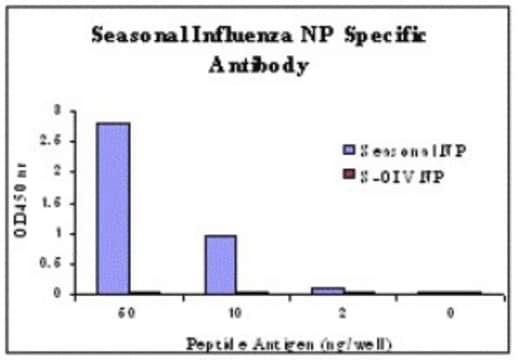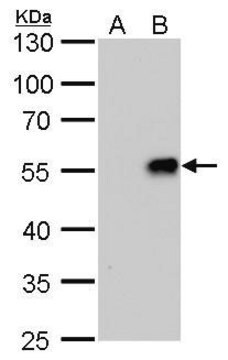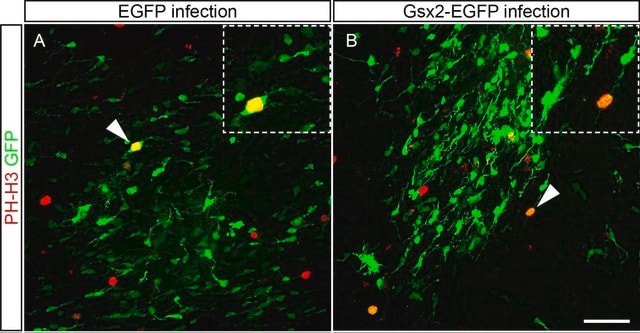MAB8261
Anti-Influenza A Antibody, H1N1, clone 9B3.2
clone 9B3.2, Chemicon®, from mouse
Iniciar sesiónpara Ver la Fijación de precios por contrato y de la organización
About This Item
UNSPSC Code:
12352203
eCl@ss:
32160702
NACRES:
NA.41
Productos recomendados
biological source
mouse
Quality Level
antibody form
purified immunoglobulin
clone
9B3.2, monoclonal
species reactivity
human
manufacturer/tradename
Chemicon®
technique(s)
immunofluorescence: suitable
isotype
IgG2a
shipped in
wet ice
Specificity
Influenza A H1N1 antigen. No reactivity shown to Influenza B strains.
SPECIES REACTIVITY:
Reacts strongly with the following H1N1 strain: Beijing. A/ Texas /36/91, A/Berkeley/1/98, A/HongKong/503/97,A/Nanchang /16A/98,A/PR8/34 and New Caledoniastrain.
SPECIES REACTIVITY:
Reacts strongly with the following H1N1 strain: Beijing. A/ Texas /36/91, A/Berkeley/1/98, A/HongKong/503/97,A/Nanchang /16A/98,A/PR8/34 and New Caledoniastrain.
Immunogen
Epitope: H1N1
Influenza blend
Application
IF
Optimal dilutions must be determined by end user
Optimal dilutions must be determined by end user
Research Category
Infectious Diseases
Infectious Diseases
Research Sub Category
Infectious Diseases - Viral
Infectious Diseases - Viral
This Anti-Influenza A Antibody, H1N1, clone 9B3.2 is validated for use in IF for the detection of Influenza A.
Physical form
Format: Purified
Purified immunoglobulin. Liquid in 0.02 M Phosphate Buffer + 0.25 M Sodium Chloride + 0.1% Sodium Azide, pH = 7.6
Storage and Stability
Store at 2° to 8°C for up to 12 months from date of receipt.
Other Notes
Concentration: Please refer to the Certificate of Analysis for the lot-specific concentration.
Legal Information
CHEMICON is a registered trademark of Merck KGaA, Darmstadt, Germany
Disclaimer
Unless otherwise stated in our catalog or other company documentation accompanying the product(s), our products are intended for research use only and are not to be used for any other purpose, which includes but is not limited to, unauthorized commercial uses, in vitro diagnostic uses, ex vivo or in vivo therapeutic uses or any type of consumption or application to humans or animals.
Storage Class
10 - Combustible liquids
wgk_germany
WGK 2
flash_point_f
Not applicable
flash_point_c
Not applicable
Certificados de análisis (COA)
Busque Certificados de análisis (COA) introduciendo el número de lote del producto. Los números de lote se encuentran en la etiqueta del producto después de las palabras «Lot» o «Batch»
¿Ya tiene este producto?
Encuentre la documentación para los productos que ha comprado recientemente en la Biblioteca de documentos.
Sialylneolacto-N-tetraose c (LSTc)-bearing liposomal decoys capture influenza A virus.
Hendricks, GL; Weirich, KL; Viswanathan, K; Li, J; Shriver, ZH; Ashour, J; Ploegh et al.
The Journal of Biological Chemistry null
Claudia Bank et al.
Evolution; international journal of organic evolution, 70(11), 2470-2484 (2016-11-01)
The rapid evolution of drug resistance remains a critical public health concern. The treatment of influenza A virus (IAV) has proven particularly challenging, due to the ability of the virus to develop resistance against current antivirals and vaccines. Here, we
Kristina L Prachanronarong et al.
Journal of virology, 93(2) (2018-11-02)
Influenza A virus (IAV), a major cause of human morbidity and mortality, continuously evolves in response to selective pressures. Stem-directed, broadly neutralizing antibodies (sBnAbs) targeting the influenza virus hemagglutinin (HA) are a promising therapeutic strategy, but neutralization escape mutants can
Li Jiang et al.
Journal of virology, 96(6), e0198221-e0198221 (2022-01-20)
Many oseltamivir resistance mutations exhibit fitness defects in the absence of drug pressure that hinders their propagation in hosts. Secondary permissive mutations can rescue fitness defects and facilitate the segregation of resistance mutations in viral populations. Previous studies have identified
Shaopeng Wang et al.
Proceedings of the National Academy of Sciences of the United States of America, 107(37), 16028-16032 (2010-08-28)
We report on label-free imaging, detection, and mass/size measurement of single viral particles in solution by high-resolution surface plasmon resonance microscopy. Diffraction of propagating plasmon waves along a metal surface by the viral particles creates images of the individual particles
Nuestro equipo de científicos tiene experiencia en todas las áreas de investigación: Ciencias de la vida, Ciencia de los materiales, Síntesis química, Cromatografía, Analítica y muchas otras.
Póngase en contacto con el Servicio técnico








